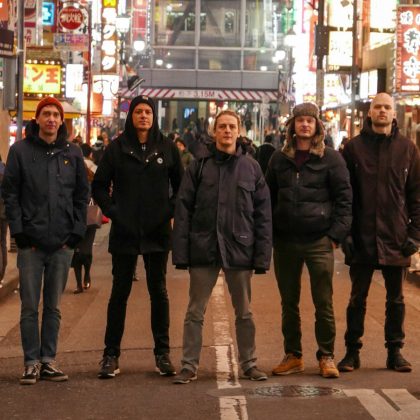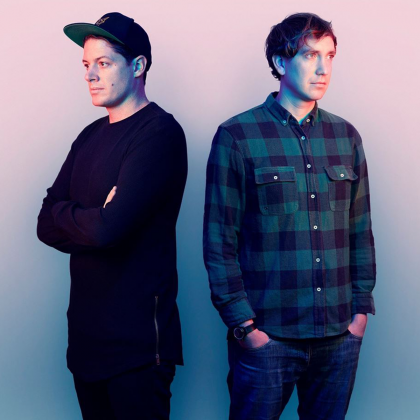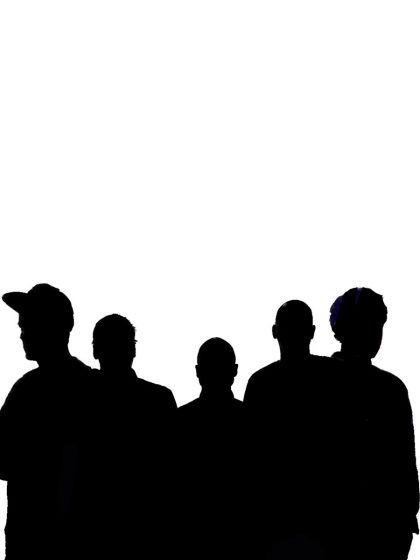The Upbeats on the Drum & Bass Noise War, Incest and History
Once the Upbeats’ Jeremy Glenn has discovered a café that features the New Zealand-created flat white coffee in Los Angeles, the drum & bass producer/DJ makes a beeline for that location on the regular. The affable Glenn, who is based in Wellington, New Zealand, has a few days in the city before joining Ed Rush and Optical on their Bassrush Virus No Cure LP tour, which also features FuntCase. On the other side of the globe, Glenn’s music partner, Dylan Jones—who has transplanted to London, UK, from Wellington—is escorting his visiting mother around town. “It’s a classic New Zealand/Australia dispute as to who invented the flat white,” the soft-spoken Jones points out. “Like Pavlova, Crowded House, and Russell Crowe.”
“Drum & bass is a noise war. People are trying to make things far too loud, and it stifles creativity to a certain extent.”
While Glenn and Jones have been friends since high school, the two are rarely in the same place these days. The duo have recently had the collaborative Dead Limit EP with Noisia released on the Dutch powerhouse’s Vision Recordings, and they are wrapping things up for their fifth album, set for release in 2016, again on Vision. Albums are the norm for the two, who in addition to the ones on Vision, have had releases on Bad Taste and Loop Recordings, as well as their own, recently quiet Non Vogue label. They have also produced albums for Shapeshifter and done endless tracks with Armanni Reign as Society of Numbers, an EP of which will be out on Noisia’s Division imprint in the coming months. Additionally, for their odder, harder-to-pin sounds, the two go as Snake & Wolf, with a proliferation of material under that header.

Just prior to Dead Limit, the Upbeats had a feature on Mefjus and InsideInfo’s “Footpath”/“Leibniz” on Virus Recordings, a return of sorts for them. “We jumped at the opportunity to be on this Virus tour,” says Glenn as he readies himself for a bass music superstar poker game that includes, among others, Flux Pavilion, Dirtyphonics and Flinch. “The fact that Ed Rush and Optical have gone back to a really Virus-sounding album is amazing. It sounds organic and real. Everything I love about drum & bass basically, they got back to it.”
Drum & Bass Takeover
Jeremy: My dad had Scandinavian snowboarder friends coming to [visit] in the mid-‘90s. They brought this CD with them, Junglized. It had “Circles” by Adam F on it. I remember falling in love with that song. And my mum had given me Platinum Breaks for a Christmas present, before I know what drum & bass was. I listened to it, thought it was boring, took it back, and swapped it for Pearl Jam. A year or two later, when I started having money to buy CDs, I tracked down Junglized and bought Grooverider’s Mysteries of Funk. Roni Size/Reprazent’s New Forms came out, and I started getting into Aphrodite and Mickey Finn. All of my friends hated it. Dylan was a rock kid through and through. I slowly worked on him and convinced him this drum & bass thing wasn’t too bad. We started going to parties in 1999 and stumbled on Konflict and Bad Company, and that was it—game over for us.
Dylan: I had a war against drum & bass. Jeremy was trying for ages to get me into it. It was Grooverider’s “Where’s Jack the Ripper?” that was the first track I remember thinking, “I can get into this.” From then on, something clicked. I started going to proper parties. Seeing it in a nightclub is the thing that makes it work, makes you understand what it’s about. A proper system shakes you. But we started making music before we went to parties. No one else was doing it, but we were geeky and into playing Diablo. It was on a computer, and we thought it could be fun.
Drum & Bass Variations
Jeremy: Part of the reason drum & bass has stayed interesting and relevant for such a long time is it is open to drawing influences from a lot of places. We write drum & bass and we perform drum & bass, so we are constantly surrounded by it. I listen to what other people are doing and look for new music to DJ, and I really enjoy that, but just sitting around and listening to music—we haven’t listened to drum & bass for years. It would be too much.
For us, it’s always been a really big thing to draw inspiration from unexpected areas. We’ve got pretty left-field tastes in music; that’s played a big part in our direction, musically. Tame Impala are a big inspiration for us. The sound, the aesthetic they go for, we spend a lot of time trying to make elements of our music sound like that.
SEE ALSO: The Upbeats Break out the D&B Filth With This Exclusive Halloween Mix
We played one of the best festivals, Pukkelpop in Belgium, this summer and briefly met Kevin Parker from Tame Impala. We had a complete fan moment. We’re almost tearing up, “Oh my god! We’re the biggest fans! From New Zealand! Hi!” But Tame Impala’s album, Currents, hasn’t surpassed Unknown Mortal Orchestra’s album, Multi-Love. Also been listening to the Jamie xx album, In Colour, a lot—that my dad played me—and I’ve fallen in love. Another recent thing is Little Dragon. Those are our three biggest influences for our upcoming album. I was never that into hip-hop, but a couple of years ago I got turned on by hearing Kendrick Lamar and A$AP Rocky. Same with R&B, but then I heard Frank Ocean. Now I listen to far too much hip-hop and R&B, like PartyNextDoor, Drake, Tory Lanez.
Dylan: Jeremy’s more electronic and hip-hop leanings. I’m more guitar-y, indie vibes. I love the whole Brainfeeder camp, Deerhunter, Beach House, a lot of shoegazer, dreamy stuff. It’s a constant battle with trying to do dancefloor stuff and at the same time doing things that are influenced by these other styles that don’t really cross over. But if you’re doing the same thing over and over and over, granted you perfect your craft, but bringing something else to it keeps us on our toes. A little inspiration from somewhere, slap it on one of those drum & bass trends, and you’ve got a new angle that is a lot different.
Drum & Bass Incest
Jeremy: We signed some music to this really dodgy Puerto Rican dude who spun this amazing story about setting up this label and how great it was going to be. Nothing happened, but Vegas and Maldini were playing in Puerto Rico and were at this house party in a Jacuzzi where someone was DJing one of our songs. Maldini asked about it, and word got back to us. A couple of weeks later, they were playing in Wellington, and I gave them a CD. The following week, I got a message from them saying, “We want to sign you.”
Around the same time as our album being released on Bad Taste Recordings in 2006, our Virus release, “Lost Once”/”Lick-a-Demon” came out and did really well for us. We didn’t make waves outside of New Zealand for a long time, not until Virus. That was the start of us going to Europe and doing a reasonable amount of shows over there. When Ed Rush and Optical started playing our songs, it was a big deal for us. It was really hard to break through, to get people to be okay with you, or take the time to listen to your music. People listened to us because we were signed to Bad Taste; otherwise, there was no way we would have gotten anyone to listen to us. We were also fortunate that, at the time, there was attention on Australian and New Zealand—because Concord Dawn was coming up, Pendulum were coming through—so people were hunting the new hotspot.
A big part of what we love about doing this is how social it is. We travel a lot, and the most fun thing to do in our downtime is to get with some friends, play with music, and see what happens. Writing music is supposed to be fun. There isn’t any appeal in collaborating online. We always collaborate in person. It’s all about capturing an energy in the room and the vibe between people.
Dylan: Everyone in drum & bass is super nice. We’ve managed to fall into these different posses, with Noisia, with Virus, with Black Sun Empire. We’re maybe a bit too pigeonholed with releasing each other’s music, but it seems to work. It boils down to each of us having a label. It’s an unwritten rule that if you write something in someone else’s studio, they decide what they want to do with it. Because we’re doing stuff with these guys and they’re buddies, that’s how this sharing between labels thing happens—which looks odd from the outside.
Drum & Bass Then and Now
Jeremy: What is worse now is drum & bass is a noise war. People are trying to make things far too loud, and it stifles creativity to a certain extent, especially with what we’re doing with harder dancefloor stuff. People get too fixated on the technical aspects, and not enough focus is put on ideas. I’m much more interested in vibe than I am an immaculate mixdown. We used to have a basic approach to production, and we’re more like songwriters than engineers—especially with producing for Shapeshifter, it’s made us up our game and focus on our production techniques and being more professional.
What’s better now is everything is so readily available. There is so much music out there, and people can pick it up pretty quickly. When we started producing, there were no tutorials, no YouTube, none of that stuff. By the time we started writing music, it had a certain standard. Being in New Zealand and not having any other people around us, we had to figure out our own way to get there, so what we were doing sounded different. Now you can learn really quickly, but if you’re going to follow tutorials, you can’t help but sound like a lot of other people. But it does mean there’s a lot of amazingly produced music. It was hard for us to come through when we did, but it would be so much harder now. The amount of free music that gets given away on SoundCloud, it would be so hard to get people’s attention. And people’s attention spans are so short.
People that had been around before us had made money off records. The switch in their head from “I’m writing music to make money” to “I’m writing music that I can use to do gigs to get money” was hard thing to come to grips with. For us, the money we made off selling music has always been negligible. The way the industry was run was terrible. The first release we did on Virus was one of the only records we got paid any money from. When we started doing gigs and making a name for ourselves, it was after the decline of records sales, so we already had the mindset of releasing music as a way to do gigs. If people are listening to our music, sharing it, and want to come out and see us perform, that’s why we do it.
Another thing that’s been good is seeing the change from the way the industry was run to how it is now. It’s a lot more professional. DJ Fresh was one of the first ones to start implementing the professional label model with Breakbeat Kaos. Labels that are doing well in drum & bass are the ones that are run professionally, as a business: Ram, Hospital, Shogun, Critical, Blackout, Vision and Division. As a career musician, it feels better that the industry takes things more seriously and is more accountable now.
Dylan: Carrying around vinyl was one thing, but even CDs feel so dated. It was a pain in the ass burning new CDs before every show and carrying a wallet around. But I don’t know if it’s a good thing that things are so easily accessible. People aren’t buying music as much.
But these days, if you’ve got good ideas, you can execute them easily. The harder thing is having the idea to put down. If we have a great idea, we have the skills to build it up quickly and put it down, but 80 percent of it is trying to find that idea, that spark—that’s the hard thing. My fear is having to change to a new program and relearn stuff, to completely change techniques and workflow and everything. That would be insane.
Follow The Upbeats on Facebook | Twitter





